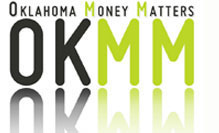About Us
Oklahoma Money Matters (OKMM) is a personal finance education program that helps K-12 schools, higher education campuses, businesses and community partners develop or expand educational services that empower Oklahomans to make positive financial choices.
An initiative of the Oklahoma College Assistance Program and the Oklahoma State Regents for Higher Education since 2004, OKMM offers information, resources, and a variety of services to educate students, adults and families about managing personal finances, saving, consumer credit, financial aid and student loan management.
OKMM also participates in and supports financial literacy projects, professional meetings and statewide conferences hosted by a wide variety of organizations, including the Oklahoma Council on Economic Education and the Oklahoma Jump$tart Coalition, of which OKMM was a founding member.
What can OKMM do for you? We offer a variety of free services.
Services
Services Spotlight:
Financial Literacy Standards for Oklahoma Students
Personal financial education is crucial for everyone because it empowers individuals to make informed decisions about their money, leading to financial stability, security and the ability to achieve personal goals.
Information is provided on each of the 14 Oklahoma Personal Financial Literacy standards. These standards are considered essential for students and adults, equipping them with the knowledge to become responsible consumers, savers, investors, and money managers, and to participate effectively in society.
The 14 areas of instruction include:
- Earning an income
- Understanding state and federal taxes
- Banking and financial services
- Managing a bank account
- Savings and investing
- Planning for retirement
- Understanding loans and borrowing money, including predatory lending and payday loans
- Understanding interest, credit card debt, and online commerce
- Identity fraud and theft
- Rights and responsibilities of renting or buying a home
- Understanding insurance
- Understanding the financial impact and consequences of gambling
- Bankruptcy
- Charitable giving
Learning is reinforced through a short quiz at the end of each topic.
What Can OKMM Do For You?
For Students and Parents
- Empower college-bound individuals and their families by providing comprehensive information about preparing financially for higher education, including navigating the complexities of financial aid options like grants, scholarships and loans.
- Enhance financial well-being within families by providing access to our educational resources and guides that strengthen budgeting skills and promote responsible money management.
- Cultivate financially saavy younger generations by sharing effective techniques and engaging activities to teach children and teenagers about personal finance, from basic concepts like saving and spending to more advanced topics like investing and credit management.
For Higher Education Campuses
- Help you develop a financial education component for existing services
- Offer money management tools for new student orientation workshops
- Provide instructional materials for campus workshops
- Create informative publications you can share with students and families
- Develop personal finance content for your website or newsletter
- Share educational resources for campus financial aid events
- Disseminate research in financial literacy data and trends
- Connect you with financial education providers in your service area
For K-12 Schools
- Locate supplemental materials and activities for classroom instruction
- Connect you with local financial education providers for classroom presentations
- Develop financial literacy tools to share with students and parents
- Develop personal finance content for websites and newsletters
Directions To Our Office

Oklahoma College Assistance Program
655 Research Parkway, Suite 200
Oklahoma City, OK 73104
Parking
Visitors can park in any spot marked “two hour limit.” Please note this time limit is strictly enforced. If you plan to stay longer than two hours, visitors should enter the office area and the parking garage from Lincoln. Street level is actually the second level of the parking garage and the first level of the office building.
When entering the garage, take a ticket and before leaving the building, exchange the ticket for a token from a State Regents' receptionist.
View Google map of 655 Research Parkway
What OKMM Wants Every Oklahoman to Know
Everyone needs a budget. Money management isn’t about how much money you have, it’s about what you do with the money you have. Whether you’re a college student, a single parent working two jobs or you’re independently wealthy, you need a realistic spending plan. Create a plan that fits your lifestyle, meets your needs and reflects your financial goals.
Saving is necessary. Not only is saving the key to preparing for the unexpected, it also helps you reach your financial goals and build wealth. Many people wait until the end of the month to save, only to realize there’s nothing left. Since it’s harder to spend what you don’t see, treat saving like a bill and pay it first! Each pay period, set aside a particular amount for your savings account. Aim to save three to six months' worth of living expenses in an emergency fund; this will keep you from relying on credit cards or payday loans in the event of an emergency. After your emergency reserve is fully funded, continue saving for other priorities, such as a down payment on a home, a college education or retirement.
When managed wisely, credit is a useful tool. Very few people can purchase a big-ticket item like a vehicle or home without using some form of credit. Think carefully about how and when you use credit, and if you do choose to charge, don’t use credit to fund a lifestyle you can’t afford. Finance only what you’re capable of repaying and set up a repayment plan for yourself. Pay bills on time and strive to pay in full. If paying in full isn’t possible, it’s always best to pay more than the required minimum monthly payment.
Protect your personal information. It’s easier to prevent identity theft than to overcome it. An identity theft case now occurs every 22 seconds (IdentityTheft.org). Depending on the type of identity theft, how quickly it’s discovered, and the extent of the damage, it can take the victim from a few days, months or even years to remedy the situation (IDShield). Protect yourself by
knowing where your personal identifying information is and keeping it safe. Your Social Security card, credit account statements and financial aid paperwork include vital information that could be used against you by an identity thief. It’s a good idea to shred documents you no longer need and store those you should keep in a fire-safe, waterproof lockbox.
Be strategic about paying for college. The first step is to complete the Free Application for Federal Student Aid (FAFSA) as soon as possible after Oct. 1 of the senior year of high school and each year you need financial aid for college. The FAFSA is used to determine the student’s eligibility for federal aid, including grants, scholarships, work-study and federal student loans. Some state and private financial aid programs require FAFSA completion, too, such as Oklahoma’s Promise. It’s best to maximize grants and scholarships and use any available family savings to cover educational costs. However, many students need an education loan to cover college expenses. It’s important for students to borrow only as much as they need to pay educational expenses, because each dollar borrowed must be repaid — plus interest! A good rule of thumb is to borrow no more than the salary you expect to earn during your first year after graduation.
Students should exhaust all federal student loan options before considering a "private" loan. Federal loans typically have more competitive interest rates and offer more flexible repayment terms than some private loans. But students should do their homework to determine the best type of loan for their situation.
For more information about OKMM resources, services and initiatives, call 800.970.OKMM or email OklahomaMoneyMatters@ocap.org.


